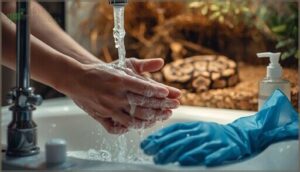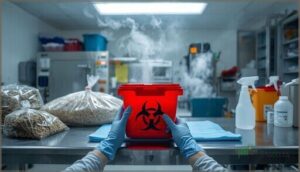This site is supported by our readers. We may earn a commission, at no cost to you, if you purchase through links.
Most reptile enthusiasts don’t realize their scaled companions harbor pathogens capable of jumping species barriers, yet transmission events occur daily in homes, breeding facilities, and veterinary clinics across the globe. Certain viral agents like inclusion body disease and fungal infections such as ophidiomycosis move readily between snakes through direct contact, contaminated substrates, and shared water sources, while bacterial pathogens including Salmonella species pose documented risks to human handlers.
Understanding the mechanisms behind these cross-species transmission events isn’t just academic curiosity—it’s essential knowledge that protects both your collection and your household from preventable illness, particularly when immunocompromised individuals or children interact with captive reptiles.
Table Of Contents
- Key Takeaways
- Are Snake Diseases Contagious?
- Which Snake Diseases Can Affect Humans?
- How Do Snake Diseases Spread Between Snakes?
- What Are The Risks of Disease Transmission?
- How Can You Prevent Snake Disease Transmission?
- Frequently Asked Questions (FAQs)
- Can snakes transmit diseases to humans?
- Do snakes carry bacteria in their mouth?
- Do snake skins carry diseases?
- Is mouth rot contagious in snakes?
- What diseases can humans get from snake feces contact?
- What are the risks of owning snakes for pregnant women?
- Are snake diseases more contagious in certain temperatures or environments?
- What is the risk of contracting diseases from wild snakes?
- Can snakes transmit diseases to other pets?
- How often should snake enclosures be disinfected?
- Conclusion
Key Takeaways
- Snakes transmit several contagious diseases to other snakes through direct contact, contaminated equipment, and shared water sources, including viral infections like inclusion body disease, fungal diseases such as ophidiomycosis, and bacterial pathogens like mycoplasma species that spread rapidly through collections without proper quarantine protocols.
- Zoonotic pathogens from snakes—particularly Salmonella, Cryptosporidium, and Giardia—transfer to humans primarily through the fecal-oral route during routine handling and enclosure maintenance, posing heightened risks to immunocompromised individuals and children under five who show increased hospitalization rates and severe complications from these infections.
- Disease prevention requires implementing strict hygiene protocols including 20-second handwashing after every snake interaction, weekly enclosure disinfection using validated disinfectants like quaternary ammonium compounds or diluted bleach, and proper waste segregation in puncture-resistant biohazard containers to interrupt transmission pathways.
- Environmental factors including poor ventilation, high humidity levels, inadequate temperature control, and overcrowded housing conditions directly increase pathogen survival rates and transmission frequency, making species-appropriate enclosure design and single-housing arrangements essential for reducing stress-related infections by 30-60%.
Are Snake Diseases Contagious?
Yes, certain snake diseases are contagious and can spread between reptiles or transfer to humans under specific conditions. Understanding which pathogens pose transmission risks, whether through direct contact or environmental contamination, is essential for safe snake ownership and husbandry.
Routine handling and cage maintenance both present exposure opportunities, so practicing proper hygiene when handling snakes reduces the chance of bacterial or parasitic transmission.
The following sections examine the types of contagious diseases found in snakes, zoonotic pathogens that affect humans, and the mechanisms through which these diseases spread.
Understanding these transmission pathways is essential, especially when you consider the broader health risks posed by snake habitats and the environments where human-snake contact occurs.
Types of Contagious Snake Diseases
You’ll encounter several contagious snake diseases in collections, including viral infections like inclusion body disease and ferlaviruses, fungal diseases such as ophidiomycosis, bacterial transmission involving mycoplasma species, and respiratory issues linked to nidoviruses. These infectious diseases spread through direct contact between snakes or contaminated equipment.
Early detection is critical, so watch for signs of snake respiratory disease like open-mouth breathing, mucus discharge, or wheezing sounds.
Parasite control matters too—reptile diseases like cryptosporidiosis move rapidly through collections, making early detection essential for preventing wider outbreaks. Understanding snake disease prevention is vital for maintaining healthy snake collections.
Zoonotic Diseases Transmitted by Snakes
While snake-to-snake transmission poses collection risks, snake-borne pathogens like Salmonella species present significant public health concerns through zoonotic disease transmission. You’re most vulnerable when handling snakes or contaminated enclosures, as reptile handling and safety protocols directly impact zoonotic risk factors.
Cryptosporidium and Giardia parasites, along with pentastomiasis from Linguatula serrata, represent key snakeborne diseases requiring disease surveillance to monitor parasite transmission and protect against zoonoses.
How Snake Diseases Spread
Understanding how pathogens move from snake to snake—and eventually to you—requires examining multiple contagion routes. Direct contact between infected and healthy snakes promotes disease vectors through skin and mucous membranes, while fecal transmission via the fecal-oral route allows snake parasites like Cryptosporidium to spread in shared enclosures.
Environmental factors, including poor sanitation, heighten zoonotic disease transmission risks, making reptile handling and safety protocols your primary defense against zoonoses.
Maintaining a well-designed enclosure with proper cleaning routines minimizes contamination risks—explore snake terrariums that prioritize hygiene and secure housing to support both safety and welfare.
Which Snake Diseases Can Affect Humans?
While snakes themselves rarely pose direct disease threats through bites alone, they carry several zoonotic pathogens that can transfer to humans through routine handling and enclosure maintenance.
The primary concern isn’t venom or aggression—it’s the bacteria, parasites, and protozoa living in your snake’s digestive tract that can make their way to you through contaminated surfaces or improper hygiene.
The real danger isn’t the snake itself—it’s the invisible bacteria and parasites in its gut that reach you through poor hygiene
Understanding which specific pathogens pose the greatest risk helps you take targeted precautions without unnecessary worry.
Salmonella and Salmonellosis
Salmonella stands out as the most significant zoonotic pathogen you’ll encounter with snake ownership, colonizing reptile intestinal tracts without causing illness in your animal.
Through the fecal-oral route, bacterial transmission occurs when you handle contaminated surfaces or your snake itself, leading to gastroenteritis within 6–72 hours of exposure.
Disease surveillance confirms reptile hygiene and strict handwashing protocols effectively reduce these zoonotic risks.
Simple steps like washing hands with soap after handling your snake or cleaning its enclosure—detailed in maintaining snake health environment—go a long way toward preventing infection.
Pentastomiasis and Parasitic Infections
Linguatulid parasites represent an uncommon yet serious zoonotic risk when handling snakes harboring pentastome larvae, which complete their life cycle through ingestion of contaminated materials. Your infection control protocols must address these pathogens alongside helminth and protozoal threats.
Consider these parasite control and prevention essentials:
- Maintain disease surveillance through regular veterinary examinations
- Understand parasite ecology to minimize environmental contamination
- Practice strict reptile handling and safety measures with protective equipment
- Recognize non-specific symptoms like abdominal discomfort or eosinophilia
- Implement sanitary husbandry reducing zoonotic risks from parasitic infections
Protozoal Diseases (Cryptosporidium, Giardia)
Protozoan pathogens, though less frequently documented than bacterial threats, pose genuine zoonotic risks through fecal transmission when hygiene protocols fail. Cryptosporidium and Giardia maintain host specificity but can cross species barriers under suboptimal conditions, making disease diagnosis essential through fecal flotation or molecular methods.
| Pathogen | Primary Transmission | Clinical Signs |
|---|---|---|
| Cryptosporidium | Fecal-oral route | Enteritis, diarrhea |
| Giardia-like cysts | Contaminated surfaces | GI symptoms |
| Both parasites | Overcrowded enclosures | Variable severity |
| Stress-triggered | Poor sanitation | Cross-species risk |
| Endemic protozoa | Direct/indirect contact | Detectable via testing |
Treatment options require veterinary consultation, targeting the parasite lifecycle while improving husbandry conditions to eliminate zoonotic pathogen reservoirs and prevent disease transmission.
How Do Snake Diseases Spread Between Snakes?
Disease transmission between snakes occurs through multiple pathways, each influenced by housing conditions, pathogen characteristics, and individual snake health status. Understanding these transmission routes helps you prevent outbreaks in your collection, whether you maintain a single pet or multiple specimens.
The following sections examine the primary mechanisms through which infectious agents spread from one snake to another, including both direct contact and environmental contamination pathways.
Common Transmission Routes in Snakes
Infectious agents travel between your snakes through multiple pathways, with direct contact being the most straightforward method—skin-to-skin transmission occurs when snakes interact, especially through wounds or mucous membranes.
The fecal-oral route remains particularly problematic, as snakes readily ingest contaminated substrate or explore enclosure surfaces with their mouths.
Shared water sources, infected prey, and vector-borne diseases further complicate disease transmission dynamics within reptile collections.
Environmental and Husbandry Factors
Your enclosure design, temperature control, and humidity management directly influence reptile health outcomes. Validated disinfectants at proper concentrations reduce bacterial loads by up to 99.9%.
Maintaining species-specific environmental factors and appropriate substrate selection decreases stress-related infections by 30–60%, while quarantine protocols prevent pathogen introduction into your collection.
Single-housing in properly sized enclosures minimizes cross-contamination risks in reptile husbandry and disease prevention.
Direct Vs. Indirect Disease Spread
You’ll encounter two distinct pathways in disease transmission: direct contact through bite wounds, skin abrasions, or oral secretions between snakes, and indirect contact via fomite transmission through contaminated substrates, water dishes, or handling equipment.
Environmental spread occurs when pathogens survive on surfaces, enabling cross-contamination without physical interaction.
Understanding vector-borne and fecal-oral route mechanisms protects both reptile health and prevents zoonotic diseases in your collection.
What Are The Risks of Disease Transmission?
Understanding who’s most vulnerable to snake-borne pathogens helps you make informed decisions about handling and care. Certain groups face heightened risks when exposed to these organisms, while recognizing symptoms early—in both humans and snakes—allows for prompt intervention.
Let’s examine the specific populations at greatest risk, the warning signs of infection in people, and the clinical indicators that your snake may be harboring a contagious disease.
High-Risk Groups (Children, Immunocompromised)
Vulnerable populations face heightened disease susceptibility when exposed to zoonotic pathogens from snakes. Children under five and immunocompromised individuals show increased hospitalization rates and severe complications from zoonotic diseases like salmonellosis.
Pediatric risks escalate due to developing immune systems, while those on immunosuppressive therapies require specialized high-risk management.
Public health guidance emphasizes strict hand hygiene and limited reptile contact for these groups, as immunocompromised care demands vigilant infection prevention protocols.
Symptoms of Snake-Borne Illness in Humans
When you’re exposed to zoonotic pathogens from snakes, your body won’t stay quiet. Fever symptoms and diarrhea dominate the clinical picture, with up to 60% experiencing gastrointestinal distress. Abdominal pain and nausea vomiting follow in roughly 25–40% of cases, signaling systemic infections that demand attention.
These bacteriology-driven illnesses highlight why zoonotic disease prevention matters for public health—your symptoms can escalate from mild discomfort to severe dehydration within days.
Signs of Contagious Diseases in Snakes
While human symptoms reveal exposure, your snake’s behavior tells the infection control story first. Lethargy and anorexia signal infectious diseases before respiratory distress emerges—watch for open-mouth breathing or wheezing that demands veterinary care.
Skin lesions around the mouth or cloaca, along with visible mucous membrane changes, indicate reptile health issues requiring diagnostic methods like culture or PCR to confirm disease transmission and guide snake care protocols.
How Can You Prevent Snake Disease Transmission?
Preventing disease transmission from snakes requires a combination of careful handling practices, environmental management, and personal protective measures that address both direct contact risks and indirect pathogen exposure. You’ll need to establish strict protocols that minimize the fecal-oral transmission route, which remains the primary mechanism through which pathogens like Salmonella, Cryptosporidium, and pentastomids transfer from reptiles to humans.
The following sections outline evidence-based strategies that, when implemented consistently, markedly reduce your risk of contracting zoonotic infections from captive snake populations.
Essential Hygiene and Handling Protocols
Protecting yourself from zoonotic pathogens starts with one non-negotiable habit: thorough handwashing after every interaction with your snake or its enclosure. You’ll want to:
- Scrub with soap and warm water for at least 20 seconds to disrupt the fecal-oral route
- Use alcohol-based sanitizer when soap isn’t accessible
- Avoid touching your face during animal handling
- Wear protective gear when dealing with waste material
Cleaning and Disinfection Best Practices
Beyond washing your hands, you’ll need to break the chain of contamination by keeping your snake’s habitat thoroughly clean—because pathogens like Salmonella and Cryptosporidium thrive in dirty, moist environments and can linger on surfaces for weeks. Effective enclosure sanitation disrupts the fecal-oral route before zoonotic disease transmission occurs.
| Cleaning Task | Recommended Frequency | Disinfectant Types |
|---|---|---|
| Spot-clean feces | Daily | Quaternary ammonium compounds |
| Water dish change | Daily | Diluted bleach (1:10 ratio) |
| Full substrate replacement | Weekly to monthly | Reptile-safe phenolic disinfectants |
| Enclosure deep-clean | Monthly | Steam or chlorhexidine solutions |
| Equipment sterilization | After each use | F10SC veterinary disinfectant |
Your cleaning schedules should align with disease prevention and control principles, using dedicated tools exclusively for reptile enclosures to prevent cross-contamination with household surfaces—this hygiene protocol greatly reduces pathogen load and protects both animal health and human safety.
Safe Waste Disposal and Equipment Use
After handling contaminated bedding or shed skin, you’ll need to follow strict waste segregation and containment methods to interrupt the fecal-oral route. Proper biohazard containers and equipment sterilization are non-negotiable for zoonotic disease prevention.
- Use puncture-resistant, leak-proof biohazard containers for all contaminated materials
- Segregate snake waste at the point of generation to prevent cross-contamination
- Apply validated disinfection protocols with appropriate contact times for each surface
- Sterilize reusable equipment between uses to eliminate viable pathogens
- Label and dispose of waste according to local regulations for animal health and hygiene
These disease prevention and control measures protect both reptile health and disease transmission risks to humans.
Frequently Asked Questions (FAQs)
Can snakes transmit diseases to humans?
Yes, snakes can transmit zoonotic diseases to humans through fecal-oral pathogen transfer, bites, or contaminated environments.
These pose zoonotic risks, particularly for immunocompromised individuals when proper zoonotic disease prevention protocols aren’t followed.
Do snakes carry bacteria in their mouth?
Snakes harbor diverse oral bacteria including Aeromonas, Pseudomonas, and Salmonella species on mucosal surfaces and teeth.
The bacterial flora composition varies by species, diet, habitat conditions, and whether the reptile resides in captivity or wild environments.
Do snake skins carry diseases?
An ounce of prevention is worth a pound of cure—shed snake skins can harbor skin bacteria like Salmonella and Staphylococcus, posing zoonotic risks if you don’t maintain proper reptile hygiene during snake shedding.
Is mouth rot contagious in snakes?
Mouth rot isn’t usually contagious between snakes through direct contact, but fomite transmission can occur when you share contaminated feeding tools or surfaces, spreading bacterial pathogens that cause this infectious stomatitis across your collection.
What diseases can humans get from snake feces contact?
Handling contaminated substrate harbors invisible risk—Salmonella, Cryptosporidium, and Giardia hitchhike from fecal contamination to your hands.
These zoonotic infections follow the fecal-oral route, causing bacterial infections or septicemia in vulnerable individuals.
What are the risks of owning snakes for pregnant women?
Pregnancy heightens your vulnerability to zoonotic disease transmission from reptiles, particularly Salmonella-induced septicemia, which threatens maternal health and potentially fetal infection through fever-related complications.
This makes reptile handling a significant concern for wildlife and public health during gestation.
Are snake diseases more contagious in certain temperatures or environments?
Picture a humid snake enclosure after rain—moisture clings to every surface. Temperature effects and humidity levels, combined with poor ventilation, let reptile diseases linger longer, increasing airborne transmission and disease transmission risks.
Moisture control is essential for reptile health.
What is the risk of contracting diseases from wild snakes?
Wild snakes rarely bite humans, and zoonotic disease risk remains low in most temperate regions.
Bacterial contamination from handling or environmental contact poses greater concern than viral transmission, particularly in overlapping rural habitats.
Can snakes transmit diseases to other pets?
Yes, snakes can transmit Salmonella and parasites to other household pets. This can occur through contaminated surfaces, shared environments, or direct contact. Proper biosecurity and separate housing are essential for preventing cross-species transmission and protecting animal health.
How often should snake enclosures be disinfected?
Under standard reptile husbandry, you’ll want to disinfect your snake’s enclosure weekly, though daily cleaning becomes critical during outbreaks.
Proper enclosure cleaning and adherence to hygiene protocols are essential for disease prevention and snake health.
Conclusion
Like medieval healers who isolated the infected to protect entire villages, you now hold the blueprint for preventing disease spread in your reptile collection. Whether snake diseases are contagious becomes less theoretical once you’ve implemented strict quarantine protocols, maintained flawless hygiene standards, and recognized early clinical signs.
The pathogens won’t disappear, but your vigilance transforms potential outbreaks into manageable risks—protecting both your scaled companions and every person who enters your reptile room.
- https://cdpm.vetmed.ufl.edu/services/zmdxlab/available-tests/
- https://en.wikipedia.org/wiki/Polymerase_chain_reaction
- https://ultimateexotics.co.za/the-dreaded-twins-ophidian-paramyxovirus-and-inclusion-body-disease-2/
- https://pmc.ncbi.nlm.nih.gov/articles/PMC8490724/
- https://www.nature.com/articles/s41598-020-67800-1













